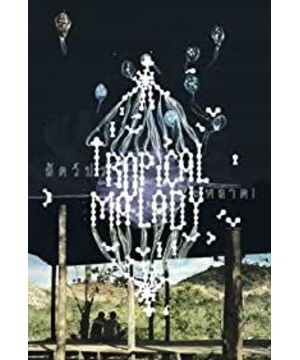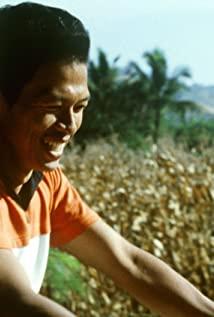Tropical Disease was the first Thai film to be selected in the main competition at the Cannes Film Festival and won the Grand Jury Prize that year. You can imagine the excitement of the judges at the Cannes Film Festival when they saw this film: the burning LGBT theme of Western society and the mystery of the East; the strong social atmosphere that caters to political correctness and the exotic Southeast Asia cooked by ancient colonial sentiments Sentiment; Apichatpong, another rising star who can be branded as a Cannes brand. Cannes certainly won't let go of this uniquely flavored masterpiece. And Apichatpong with Cannes halo has since occupied an important position on the world film stage.
"Tropical Illness" tells the story of a soldier and a country boy. This relationship is made more difficult by the appearance of a shaman ghost. The first half of the story deals with the emotional development of the soldier and the boy. In the second part of the film, the boy disappears and the soldiers enter the forest to hunt down the shaman who has been transformed into a tiger.
The early works of art film directors always have a special appeal. Although the later works will become more and more mature, the sturdy roughness of the early works has always been irresistible. I still remember the consternation after watching this structurally split film. All the notions of dramatic structure and plot design seem to falter. But the film stands on its own, making it complete and interesting.
The theme of the film is love, which is very clear in the first half and is advanced in a traditional narrative style. At the beginning of the story, a group of forest guards found a corpse in the forest. They carried the corpse down the mountain and stayed with a family. The soldier Ken met the village boy Dong. Later they met again by chance in the town. Soldiers often came to the boy's house and gave gifts to the boy's parents. The contact between the soldier and the boy became more and more frequent. They took the dog to the animal hospital to see a doctor, played games, listened to concerts, and watched movies together. The relationship between the two gradually warmed up. The two parted for the last time in the darkness, the boy disappeared into the darkness, and the soldier rode his motorcycle through the streets with uncontrollable excitement.
The second half of the film is a one-man show of soldiers, the boy seems to be taken away by the shaman ghost, and the boy seems to become a part of the shaman ghost. Soldiers hunt the shaman tiger in the forest, but are eventually conquered by the tiger. The soldier finally crawls in the forest, he prostrates to the shaman tiger and says "Devil, I give you, my soul, my body, my memory, my blood". The tiger said, "Once I eat your soul, we are neither animals nor human beings. I miss you, soldier" And just like that, the love of the soldier and the boy gains immortality in the beast devouring the soldier. Apichatpong philosophized about love in the form of myth. Of course, again, not Western philosophy, but Eastern.
Among the two protagonists, the country boy has a fuller character. He has a temporary job as a worker in an ice factory. He will stare at beautiful girls on the bus. He likes listening to music and singing. He is illiterate. illiterate. He seemed a little inferior, worried that he would look silly in the city. He would put on a military uniform to make himself appear stronger and more dignified. All this makes him seem like a very ordinary country boy, but what makes him different is that he has a soul that is easier to connect with nature.
The woman who sells flowers in the temple will take them through a narrow tunnel in the temple. The woman said that the tunnel will gradually run out of air, and there may even be poisonous gas. Some people have died because of this. Only the blessed can pass safely. Do you want to move forward? The boy said yes without hesitation, the whole body was ready to move forward, and the soldier pulled the boy back firmly. Perhaps it was because of Boy Dong's naivete about danger and death that the shaman tiger took his soul, and he was the one worthy of being picked up by the gods.
Apichatpong's films show special attention and emphasis on the relationship between modern man and nature, and the relationship between modern civilization and traditional society from the very beginning. This is the source of almost all his creative inspiration. In this two-and-a-half film, the urban landscape, supermarkets, commodities, and neon lights in the first half are also like a forest, corresponding to the natural forest in the second half. The relationship between the soldier and the boy is unsustainable in the urban forest, and can only be mingled with flesh and blood in the natural forest. It is also about love and life and death. Apichatpong brought a completely different attitude towards love and death than in the West. At the beginning of the film, the soldiers take photos with the already stiff corpses. Soldiers and villagers watch the corpses in the hammock not far away and eat dinner easily. In the mysterious East, there is no boundary between life and death. Apichatpong described death in an Eastern way, and Westerners responded enthusiastically to this cultural spectacle.
Compared with Apichatpong's later films, this film is a story that can be understood and moved. Not too many purposeful symbols. The only thing that caught the attention was the walkie-talkie, which is certainly a symbol in the modern sense. It seems that all things that travel between Yin and Yang in Eastern Mystery can also be realized through walkie-talkies. The rough, distorted voice of the walkie-talkie even arouses the curiosity of the shaman tiger, and there is at least one moment in the film that makes it seem that modernism can conquer nature. Of course Apichatpong couldn't let him really happen. In Apichatpong's world, where aggressive-leaning modernism can never control his homeland, the mysteries of the East are played out again and again under the witness of those novel electronic gadgets.
View more about Tropical Malady reviews









